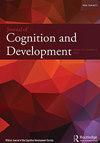扩大便利样本促进理论进步避免发展科学偏差
IF 1.6
2区 心理学
Q3 PSYCHOLOGY, DEVELOPMENTAL
引用次数: 0
摘要
摘要多样化的样本对发展研究乃至更广泛的心理学研究都是有价值的。但是便利样本——通常是从靠近大学的当地人群中招募的——仍然是发展科学中最广泛使用的样本,尽管在我们的研究中,它们的使用导致了西方、白人和高社会经济地位参与者的大量过度代表。方便样本在我们的研究中还有一席之地吗?虽然多样化的样本对于推进发展科学至关重要,但旨在鼓励招募此类样本的政策可能并不总是能够成功地以有利于我们的理论和减少偏见的方式改善样本多样性。此外,方便样本只是,嗯,方便——而且因为它们的成本更低,它们允许更快、更精确的研究。我们提出了三条解决这一矛盾的途径:1)利用理论和观察到的变化来选择在特定研究中优先考虑的多样性方面;2)将在线方法作为拓宽方便样本的重要途径;3)在团队中工作,使用许多不同的方便人群来获得“不方便”的样本。披露声明作者未报告潜在的利益冲突。本文章由计算机程序翻译,如有差异,请以英文原文为准。
Broadening Convenience Samples to Advance Theoretical Progress and Avoid Bias in Developmental Science
AbstractDiverse samples are valuable to the study of development, and to psychology more broadly. But convenience samples—typically recruited from local populations close to universities—are still the most widely used in developmental science, despite the fact that their use leads to a vast over-representation of Western, White, and high socio-economic status participants in our studies. Do convenience samples still have a place in our research? While diverse samples are crucial to advancing developmental science, policies designed to encourage recruitment of such samples may not always succeed in improving sample diversity in ways that will benefit our theories and reduce bias. Further, convenience samples are just, well, convenient – and because their costs are lower, they allow for faster and more precise research. We suggest three paths forward to resolve this tension: 1) use theory and observed variation to choose aspects of diversity to prioritize in a particular study; 2) use online methods as an important route to broaden which samples are convenient; and 3) work in teams to achieve “inconvenient” samples using many different convenience populations. Disclosure statementNo potential conflict of interest was reported by the author(s).
求助全文
通过发布文献求助,成功后即可免费获取论文全文。
去求助
来源期刊

Journal of Cognition and Development
Multiple-
CiteScore
4.00
自引率
0.00%
发文量
29
期刊介绍:
The Journal of Cognition and Development is the official journal of the Cognitive Development Society (CDS). Some CDS members are concerned with basic research or theory; others focus on policy issues and practical applications. The range of interests includes cognitive development during all stages of life, and we seek to understand ontogenetic processes in both humans and nonhumans. Finally, their interests encompass typical as well as atypical development, and we attempt to characterize both biological and cultural influences on cognitive change and continuity.
 求助内容:
求助内容: 应助结果提醒方式:
应助结果提醒方式:


